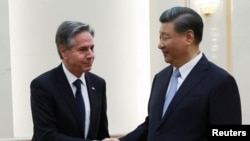"The Chinese side has made our position clear, and the two sides have agreed to follow through the common understandings President Biden and I had reached in Bali," Xi told the U.S. Secretary of State, adding the "two sides have also made progress and reached agreement on some specific issues."
Speaking following his meeting with Xi, the top U.S. diplomat said he agreed with China's leadership on the need to "stabilize" relations but that he was "clear-eyed" on vast disagreements between the two countries.
"Direct engagement and sustained communication at senior levels is the best way to responsibly manage differences and ensure that competition does not veer into conflict," Blinken told reporters.
"I heard the same from my Chinese counterparts. We both agree on the need to stabilize our relationship," he added.
Blinken's visit is the highest-level trip by a U.S. official to China in nearly five years with ties severely strained between the world's two largest economies.
"The Chinese side has made our position clear and the two sides have agreed to follow through the common understandings President Biden and I had reached in Bali," Xi told the top U.S. diplomat.
"Two sides have also made progress and reached agreement on some specific issues," he added, without elaborating.
Blinken said Monday in Beijing that China renewed promises not to send arms to Russia to fight in Ukraine, although he voiced concern at private Chinese firms' actions.
"We - and other countries - have received assurances from China that it is not and will not provide lethal assistance to Russia for use in Ukraine," Blinken told reporters after two days of talks.
The meeting, which lasted just over half an hour, came after Blinken held more than 10 hours of talks over two days with other top officials.
Earlier Monday, Blinken and China's foreign policy chief Wang Yi offered polite smiles before talks with their aides, who unlike their bosses wore masks in line with lingering COVID-19 protocols.
Away from the cameras, Wang told Blinken that his trip "comes at a critical juncture in China-U.S. relations," according to state broadcaster CCTV.
"It is necessary to make a choice between dialogue and confrontation, cooperation or conflict," he said.
"We must reverse the downward spiral of China-U.S. relations, push for a return to a healthy and stable track, and work together to find a correct way for China and the United States to get along," Wang added.
He also issued a warning on Taiwan, the self-ruling democracy claimed by Beijing.
In the past year, China has launched live-fire military drills twice near the island in anger over meetings between top US lawmakers and Taiwanese leaders.
"On this issue, China has no room to compromise or concede," Wang told Blinken, according to CCTV.
U.S. officials have voiced fears that China in the coming years will try to seize Taiwan, and insist that Washington's sales of weapons to the island are meant only to preserve the status quo.
Tensions between China and the United States have soared in recent years over a host of issues including trade, technology and Taiwan, with both President Joe Biden and his predecessor Donald Trump calling Beijing the most serious threat to long-term US global primacy.
On the streets of the Chinese capital, Sun Yi, 26, said she hoped Blinken's trip would improve the relationship and that she wanted to visit the United States.
"I think the two countries right now are like quarrelling lovers. Both sides have their own personalities and interests and are not willing to compromise," she said.
U.S. President Joe Biden has kept former President Donald Trump's hard line on China and in some areas gone further, including banning exports of high-end semiconductors to the rising power.
But Biden has also voiced hope for limited cooperation in areas such as climate and for a new in-person meeting with Xi.
The next opportunity is likely in September when Biden and Xi are both expected in New Delhi for the latest G20 summit.
Xi has also been invited to San Francisco in November as the United States leads the annual Asia-Pacific Economic Cooperation forum.








Forum